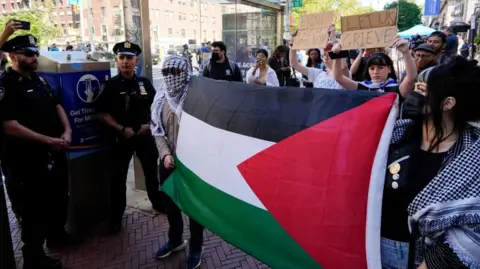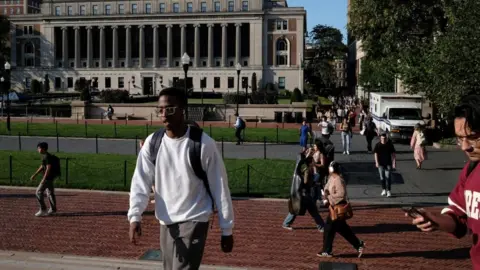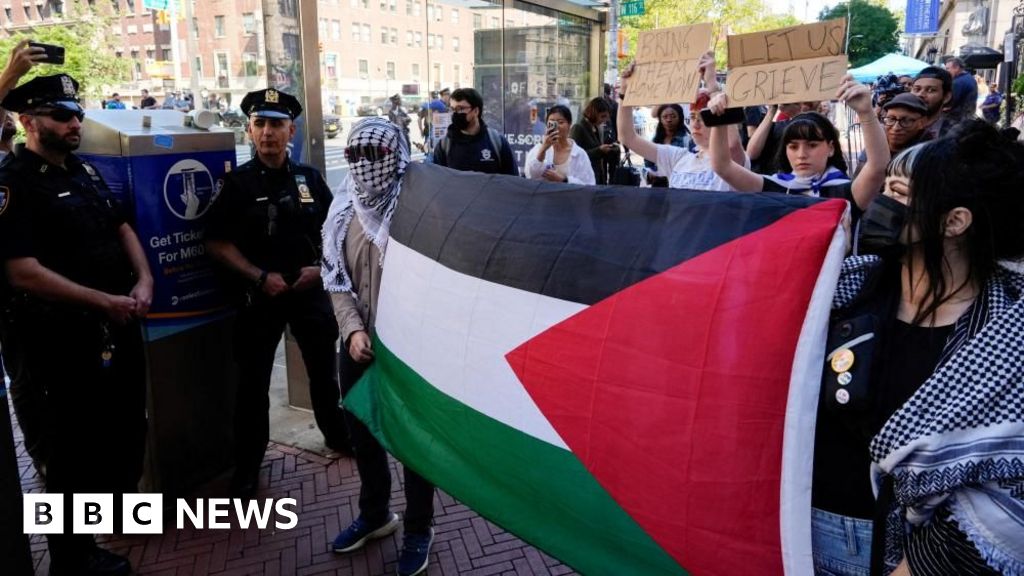Columbia University students began the school year with fresh protests and increased security just outside their famous New York City campus.
Last term, the school experienced some of the US’s largest and tensest campus demonstrations – eventually leading to the resignation of school President Minouche Shafik – as students protested Israel’s military operation in Gaza.
On Tuesday, the first day of term, all eyes were on the demonstrators who gathered just outside the school gates to see whether they would reflect the scale of the earlier protests.
Police said Tuesday’s protests led to at least two arrests, but characterised them as “peaceful”.
But the pro-Palestinian protesters – their faces covered in traditional keffiyeh scarves – could be heard several blocks from the site of the demonstration on Tuesday morning. They chanted “Free Palestine” as they banged on drums and marched in circles outside Columbia University’s famous iron gates.
On the other side of metal barricades, students and staff watched the demonstration as they queued up to have their identification thoroughly checked before they could enter campus.
Inside, the biggest disruption occurred around noon on Tuesday, according to CBS News, BBC’s US partner. The Alma Mater statue outside Low Memorial Library was doused with red paint – allegedly by protesters. The area was reportedly blocked off, as a crew worked to clean the statue.
Columbia’s last academic school year concluded with the New York Police Department raiding a pro-Palestinian encampment that had taken over the campus’s quad. Student protester then briefly occupied an academic building that police ultimately cleared, leading to more than 100 arrests.
The school cancelled its main graduation and the student body left for the summer under a cloud of deep unease. Several months later, Ms Shafik – who served as university president during the encampment and permitted the police raid – resigned.
On Tuesday, the pro-Palestinian protesters asked the students returning to school to not forget why they had protested during the last academic year.
 Reuters
Reuters“We ask that you put aside your excitement for a new school year and remember the Palestinians who died by our very dollars,” read a flier the protesters distributed.
Multiple protesters declined the BBC’s interview requests on Tuesday, and participants were generally unwilling to speak to the press.
By mid-afternoon, the pro-Palestinian demonstration concluded – though protesters chanted:”We’ll be back”.
Most students on Tuesday appeared unphased by the demonstrators. Several ran up to each other and hugged after a summer apart. Two underclassmen manoeuvred a flatscreen television through protesters and metal security barriers.
Stephanie Lee, a 28-year-old graduate student studying business, said that she expected there to be protests, but she felt “okay” on her first day on campus.
“Security is pretty good,” she added.
Rachel Black, a freshman from North Carolina, said that she saw the protests as a welcome part of her overall experience at Columbia University.
“I’m interested in becoming more educated,” she said. “I’m hoping to learn what the conflict’s about.”
 Reuters
ReutersColumbia University spokesperson Samantha Slater did not acknowledge the protests in a statement provided to BBC News.
“As we begin the new semester, we are focused on our mission of teaching, creating, and advancing knowledge and ensuring a safe, respectful campus environment for our community.”
Columbia University has experienced protests, and counterprotests, since Hamas’ attack in Israel on 7 October 2023. The attack left about 1,200 people dead and 251 people were taken hostage.
About 40,000 people have been killed in Gaza since Israel began a retaliatory campaign that has draw international criticism for its high death toll.
On Sunday, Israel announced it had recovered the bodies of six of the hostages who were taken to Gaza. Among them was 23-year-old Hersh Goldberg-Polin, whose parents waged a public campaign calling for his release.
David Lederer, a 22-year-old junior at Columbia University, held a small-counter protest along with a fellow Jewish student outside the university gates on Tuesday.
His friend held a photo of Mr Goldberg-Polin, and the two unfurled a large banner that read “Get Support for Terrorism Off Our Campus”.
Mr Lederer – who was sworn at by one passerby – is one of several pro-Israel Jewish students who have expressed concern about anti-Semitism on campus. They said the pro-Palestinian groups had not sufficiently condemned the 7 October attack or its perpetrators.
“To be anti-war is one thing, but to be pro a terrorist organization is another, and that has no place at Columbia,” Mr Lederer said.

